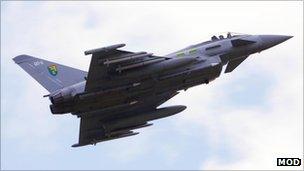RAF and Army personnel to receive redundancy notices
- Published

The armed forces are looking to shed 22,000 posts over the next four years
Up to 1,000 RAF and 1,000 Army personnel will be told on Thursday whether they are being made redundant.
RAF crews supporting operations in Libya are at risk, although nobody in Libya or its airspace or territorial waters will face compulsory redundancy.
It is the first phase of armed forces job cuts announced in the strategic defence and security review.
Shadow defence secretary Jim Murphy called it a "peculiar" way to thank RAF ground crews after the Libya campaign.
But a Ministry of Defence spokesman said: "Reducing numbers through redundancy is essential if we are to have smaller armed forces that deliver the best possible operational capability.
"We need to structure our forces to ensure that they are sufficiently flexible and adaptable to meet the demands of an uncertain future."
The armed forces are looking to shed 22,000 posts over the next four years - more than half through redundancies.
Front-line 'exempt'
Many of the redundancies were likely to be compulsory, the BBC's defence correspondent Caroline Wyatt said.
However, the Ministry of Defence has said that non-volunteers would be able to apply for a transfer to areas suffering shortages.
Personnel receiving the operational allowance, because they are serving on operations in Libya and Afghanistan, will be exempt from the cuts unless they apply, the MoD says.
It also says nobody preparing for or recently returned from operations in Afghanistan will be made redundant unless they have volunteered.
However, that means that some RAF ground personnel supporting the Libya operation in Italy or the UK could face redundancy.
The RAF said in March its jobs losses would include 170 trainee pilots, 200 weapons technicians, 529 ground tradesmen and 121 officers.
No trained pilots will be made redundant this time round.
'Performed heroics'
Mr Murphy said: "Just as many RAF personnel will be thinking about returning home having performed heroics in Libya, ministers are drawing up their P45s.
"People will be shocked and will wonder whether the government have got their priorities straight."
But an MoD spokesman said: "The revised eligibility for the operational allowance will result in payment to any member of service personnel operating within the landmass, airspace and territorial waters of Libya.
"This will include all aircrew operating over the Libyan landmass and to ships and submarines within 12 nautical miles of the coast.
"No-one deployed in land-based combat operations for which they are in receipt of the operational allowance, or within six months of deploying on those operations, or recovering from those operations on post-operational tour leave or entitled rest and recuperation will be made redundant unless they have volunteered."
Those serving in the Royal Navy will find out whose jobs are to go on 30 September. About 1,600 personnel out of a total force of 31,500 are expected to be laid off during the first tranche of cuts.
All three services called for volunteers earlier this year, and some areas had been heavily over-subscribed, our correspondent said.
Those who have volunteered for redundancy will be given a six-month notice period to serve, while non-volunteers will be given 12 months.
The government was criticised for the timing of the announcement about RAF job losses in March, which coincided with the first talks on a no-fly zone over Libya.
In a statement, Mr Murphy said the public would be unsettled by the job losses.
"Savings must be made, but in a world of uncertainty, to many this will seem a worrying loss of important capability."
Previously, Defence Secretary Liam Fox has said redundancy was "never a painless process" and that a timetable needs to be adhered to for the sake of service personnel and their families.
"To delay that [process] for political expediency would have been to betray their trust," Mr Fox told the Commons when he first announced the cuts in March.
- Published25 July 2011
- Published4 April 2011
- Published2 March 2011
- Published1 March 2011